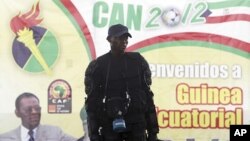As the Africa Cup of Nations kicks off in Equatorial Guinea on Saturday, non-governmental groups are drawing attention to the poverty and and less-than-open government in the oil-rich African nation - and are calling on the European Union to adopt strict disclosure laws for oil companies doing business there.
As co-host, with neighboring Gabon, of the 28th Africa Cup of Nations football (soccer) tournament, this is Equatorial Guinea's chance to shine. Earlier this month, the country's national team officially opened a new stadium in the port city of Bata, where the opening ceremonies will take place.
First-day competition in Bata features Equatorial Guinea taking on Libya and Senegal playing Zambia. The games continue for the next three weeks at different venues all across the two nations.
Equatorial Guinea President Teodoro Obiang wants to use the sports event to show the best image of his country.
But a pair of nongovernmental groups - One-France, co-founded by rock star Bono, and local NGO EG Justice - are casting a less-flattering lens on the country. According to the groups, unequal distribution of oil wealth is the big problem.
One-France Director Guillaume Grosso:
"This is a country where there is misery everywhere," said Grosso. Where two people out of three are under the poverty line. So we think that talking about football is in fact a fantastic opportunity to shed a light - a different light - on that country and what could be done to end the situation which, frankly, is just unfair. "
Headed by autocratic President Obiang, Equatorial Guinea is one of sub-Saharan Africa's biggest oil producers. But little of this wealth has trickled down to ordinary people. The country is ranked near the bottom of the United Nations Human Development Index, which looks at indicators like education, life expectancy and living standards. Also, watchdog group Transparency International ranks it among the most corrupt countries in the world on its annual perceptions index.
"The money the country earns from this wealth is not redistributed," said Grosso. "And the reason why it's not redistributed is because there's absolutely no transparency in the way the oil companies are investing in the country."
Last year, the United States agreed to join the Extractive Industries Transparency Initiative, which aims to improve governance in developing countries and the standards of companies doing business with them.
"So it's time for Europe, now that we're all talking about Equatorial Guinea, to take this question in hand and to vote a similar law," continued Grosso.
Europe is taking steps in this direction, with a European Commission proposal that would require oil, timber and mining industries to disclose their payments to governments. Spokeswoman Chantal Hughes says the Commission is pushing EU lawmakers to adopt it quickly. But Grosso says the industry lobby against the measure is very powerful, leaving it uncertain whether the proposal will become law.
NGOs Critical of Africa Nations Cup Host Equatorial Guinea
- By Lisa Bryant




